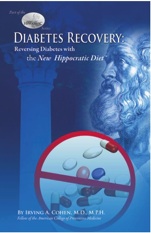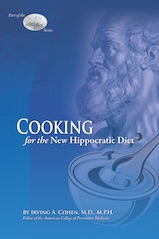Brought to you jointly by The Foundation for Prevention and Dr. Irving A. Cohen
KEY TOPICS AND QUICK LINKS:
Hidden diabetes means that you have not yet been officially diagnosed yet because your blood sugar is not constantly high. Not yet diagnosed does not mean you are healthy. Science and medicine are just waking up to this issue. Diabetes is still defined by high blood sugar, yet these early stages of type II diabetes can produce damage to your organs long before you get diagnosed. Today, different names are used such as: prediabetes, borderline diabetes, and the metabolic syndrome. This may sound as if you had not reached a disease state yet, but indeed you have. The high insulin levels and insulin resistance at this stage can be associated with heart disease, kidney failure, neuropathy and other disorders long before you have been pronounced "diabetic".
** Diabetes is a serious disease. This website can not and is not intended to provide individual medical advice. If you are currently using any form of diabetic medication, significant dietary change may necessitate modification or discontinuation of your medication schedule. Consult a qualified medical practitioner for individual direction and medical advice. **
KEY TOPICS AND QUICK LINKS:
Could you be a Hidden Diabetic?
Hidden diabetes means that you have not yet been officially diagnosed yet because your blood sugar is not constantly high. Not yet diagnosed does not mean you are healthy. Science and medicine are just waking up to this issue. Diabetes is still defined by high blood sugar, yet these early stages of type II diabetes can produce damage to your organs long before you get diagnosed. Today, different names are used such as: prediabetes, borderline diabetes, and the metabolic syndrome. This may sound as if you had not reached a disease state yet, but indeed you have. The high insulin levels and insulin resistance at this stage can be associated with heart disease, kidney failure, neuropathy and other disorders long before you have been pronounced "diabetic".
Don't wait. There are sensitive tests your doctor can use. Ask for these additional tests as part of your routine check-up or health screening.
If you ask yourself these questions, they may tip you off to your diabetes risk:
- Do you have any blood-relatives with type 2 diabetes? If so, how many?
- Have you ever been told you were pre-diabetic, borderline diabetic, had sugar in your urine, had an elevated blood sugar (even slight) or had the metabolic syndrome?
- Do you notice visual changes that seem to come and go?
- Do you consider yourself overweight or been told you were by a health professional?
- Did you experience gestational diabetes when pregnant?
- Do you experience rapid mood swings, panic attacks, or sudden episodes of anxiety?
- Do you eat when you are upset, to feel better, or do you feel hungry in mid-morning, just hours after breakfast?
- Have you ever been told you had hypoglycemia or think you have experienced episode of low blood sugar?
- Do you take more than one medication for depression?
- Is your waist circumference great than your hip measurement or do you feel that your belly sticks out?
- Women - Is your waist greater than 35 inches in diameter? 31½ if you have an Asian or Latin American background
- Men - Is it greater than 40 inches? 35½ if you have an Asian or Latin American background. Use your actual waist, not the size of your low-slung pants.
- Women - Have you had irregular periods, facial hair, excessive acne, infertility, cysts or been diagnosed with Polycystic Ovary Syndrome?
If you answered yes to any of these you might be at increased risk of developing Type 2 Diabetes or already in it's early stages. Your doctor can order simple tests, to catch it early and save your life. Some of these are:
– Hemoglobin A1C shows your average blood sugar over the past several months. This is useful in detecting when your blood sugar is often high, but looks normal after an overnight fast.
– High sensitivity C-reactive protein. This test can show inflammation in early diabetes and the metabolic syndrome.
– Fasting insulin level. This shows how much insulin your body must produce to maintain a normal sugar level. Anything but the lower end of the range should be considered a marker for insulin resistance.
– Glucose tolerance test. Sometimes used, this test requires you to drink a sugary mixture and wait in the lab for several hours while they take several blood samples to see how quickly your sugar returns to normal.
Your purchase of books or courses at this website will help fund the Foundation for Prevention in its work.
Thank You.
Thank You.


